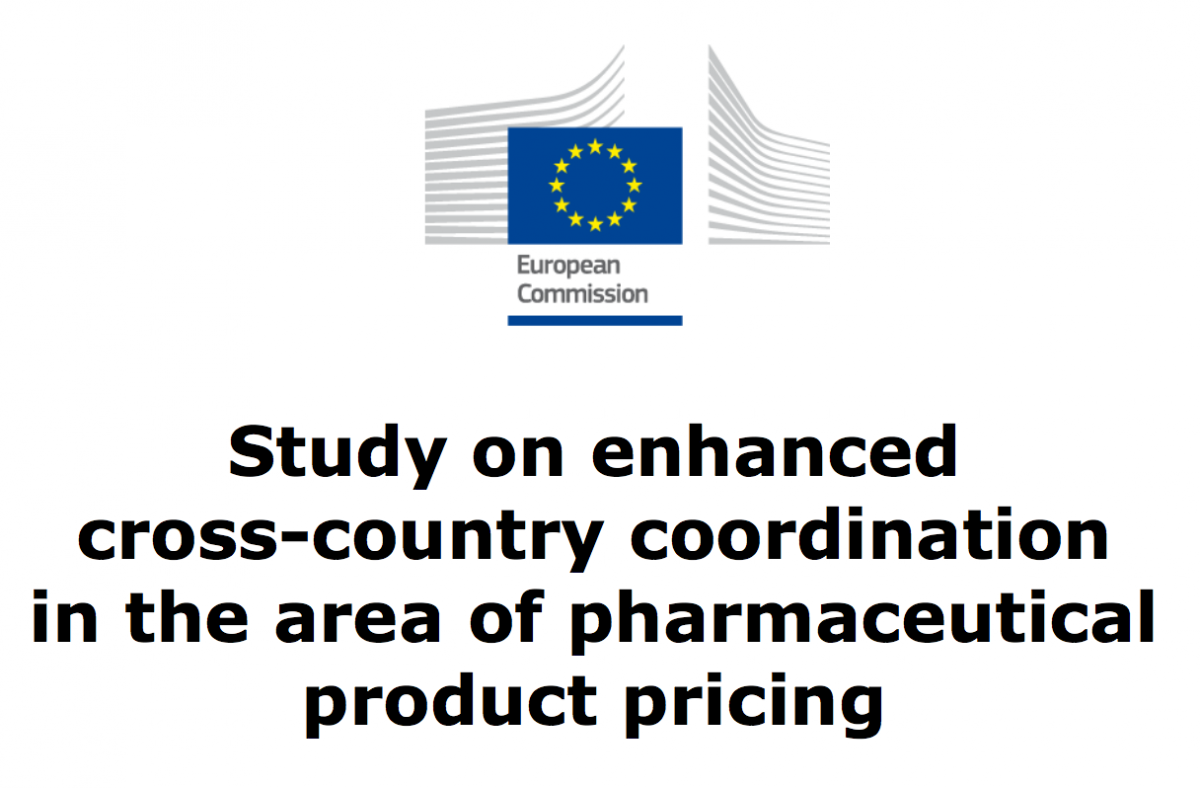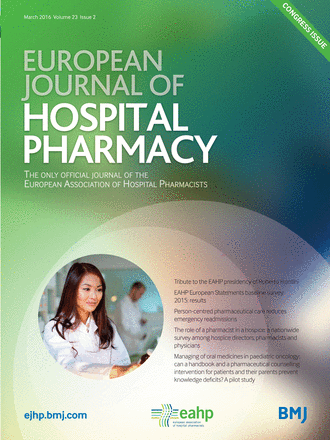EAHP EU Monitor - 07 March 2016
 The EAHP EU Monitor is a regular round up of news relevant to hospital pharmacy in Europe.
The EAHP EU Monitor is a regular round up of news relevant to hospital pharmacy in Europe.
You can subscribe to receive the EAHP EU Monitor by email here.
 MEPs signal support for significant regulatory clampdown on antimicrobial use in the veterinary sector
MEPs signal support for significant regulatory clampdown on antimicrobial use in the veterinary sector
Members of the European Parliament (MEP)'s Environment and Public Health Committee (ENVI) have advocated banning collective and preventive antibiotic treatment of animals, and supported measures to stimulate research into new antibiotics, including longer data protection.
The important signaling vote came as part of the European Parliament's scrutiny of European Commission proposals to modernise the existing EU regulatory framework for veterinary medicine.
French centre-right MEP Françoise Grossetête has the lead 'rapporteur' responsibility for delivering the opinion of the ENVI committee, and her report was overwhelmingly endorsed by political groupings within the Committee, approved with a majority of 60 to 2.
Highlights of the ENVI Committee opinion include amendments intended to:
- limit the prophylactic use of antimicrobials (i.e. as a preventive measure, in the absence of clinical signs of infection) to single animals and only when fully justified by a vet;
- prevent overuse of collective treatment (i.e. treating a group of animals when one shows signs of infection), with treatment restricted to single animals that are identified as being at a high risk of contamination; and,
- prevent veterinary medicines being used to improve performance or compensate for poor animal husbandry.
The ENVI Committee report will be put to a full vote of the European Parliament during the March or April plenary sessions in Strasbourg. Following this, the Parliament commences a negotiation with national governments to secure its proposed amendments in the final legislation.
EAHP Vice-President Tajda Gala, who leads the Association's representation on the topic of antimicrobial resistance, commented:
"I would like to add my congratulations to Françoise Grossetête and the ENVI Committee for this well-reasoned report. It reveals yet again the benefits of subjecting Commission proposals to the proper scrutiny of the Parliament. To combat antimicrobial resistance, and its threat to human health, strong action is needed in all sectors, including the veterinary sector. These sensible amendments from the European Parliament will help to achieve that."
ENVI Committee press release here.
Full report of the ENVI Committee here.
.jpg) European Medicines Agency seeking to develop a harmonised definition of medicines shortage
European Medicines Agency seeking to develop a harmonised definition of medicines shortage
The European Medicines Agency (EMA) has called for the establishment of a harmonised definition of a medicine shortage after hosting a meeting of national regulatory authorities, the pharmaceutical industry, and other stakeholders such as EAHP, to discuss the development of proactive approaches to preventing shortages in supply.
The formal report of the October 2015 meeting has now been published and provides insights to current intended direction of medicines agencies in Europe towards the shortages issue.
Problems with defining shortage
As preparation for the meeting a survey was conducted which revealed that most Member States do not have a definition for a shortage (18 out of 28 responses). The lack of a common definition was highlighted several times during the workshop as an obstacle for a common approach in dealing with shortages. The report of the meeting notes: "This lack of clarity about what a shortage is means that the conditions for reporting shortages differ from one country to another which makes benchmarking and comparisons very difficult."
The continuing problems faced by patients and healthcare professionals
At the meeting, EAHP presented headline results from its 2014 survey of medicines shortages across Europe. The report of the survey revealed 86% of hospital pharmacists report that medicines shortages are a current problem in the hospital they work in, with 66% stating that shortages are affecting their hospital on a daily or weekly basis. Reported impacts for patients included delayed or interrupted chemotherapy treatment, additional side effects, heightened Clostridium difficile risk and deterioration in their condition. EAHP emphasized the need for greater international coordination of efforts to combat what is clearly a global problem. This should include a step change improvement in the information made available to healthcare professionals about shortages, with available national best practices shared and taken up. Regulatory activity in the United States was pointed to as an example.
Recommendations from the workshop
The recorded recommendations from the workshop are:
- the need for a harmonized definition of a medicines shortage;
- the requirement to identify at what point a manufacturing or quality issue becomes likely to lead to a meaningful disruption as well as when it should trigger a report to authorities;
- national regulators should agree on common trigger points for notification as well as harmonised data requirements across the EU;
- a European shortages communication network, similar to a rapid alert network, should be constructed; and,
- the pharmaceutical industry should consider the value of stress tests to evaluate effectiveness of measures in place to prevent shortages.
The European Medicines Agency will update its implementation plan on this topic accordingly and further developments are awaited.
The report of the meeting is available here.
Presentations and documentation related to the meeting available here.
EAHP research and advocacy points on shortages here.
Commenting on the published report of the meeting, EAHP Board Member Aida Batista, who is the Board lead on medicines shortages, said:
"The headline recommendation of this meeting on the need for a harmonized definition on medicines shortages is absolutely right. However it is imperative that that definition is not of a highly restrictive nature. For example, some at the meeting advocated only defining a medicines shortage if it could be categorized as providing a "high risk". This will not do. Every medicines shortage causes problems for patients and healthcare professionals, with risks of error contained from substitution to alternatives. This problem must be dealt with holistically and in totality.
"We also emphasised at the meeting the need for transparency in medicines shortage information. As the example of the USA and some countries in Europe show, when you make information on shortages public terrible events do not occur. Public debate and solution finding is certainly better informed however."
 European Commission publish study investigating differing national approaches to the medicines pricing challenge
European Commission publish study investigating differing national approaches to the medicines pricing challenge
The European Commission has published a new study examining differing approaches by national governments in the EU to the challenge of managing medicines expenditure. The report pays particular attention to the phenomena of external reference pricing, and the prospects for a European approach of 'differential pricing' according to country GDP (Gross Domestic Product).
External reference pricing
EPR, also known as external reference pricing or international price comparison/benchmarking, is defined in the report "as the practice of using the price(s) of a medicine in one or several countries in order to derive a benchmark or reference price for the purposes of setting or negotiating the price of a medicine in a given country."
EPR is used in 29 countries in the EU, as well as in Iceland, Norway, Switzerland and Turkey, though different approaches are applied in Germany, Sweden and the UK, which employ various forms of EPR, value-based pricing (VBP) and other pricing regulation schemes.
According to a survey from last year, the commission found that 20 of the 29 countries that apply EPR use this policy as their sole or main pricing policy. Countries most frequently referenced to are France, Belgium, Denmark and Spain, followed by Italy, the UK and to a lesser extent, Austria, Germany and Slovakia.
But the details of how an EPR scheme is designed differs between countries, the report notes, as 21 countries compare medicine prices at the level of ex-factory prices, while eight countries at the pharmacy purchasing price (wholesale price) level.
The study identifies ways in which EU countries could improve the operation of external reference pricing, including improving:
- the account taken of currently confidential discounts;
- the operation of the 'Eurepid database' for sharing information between EU countries on pricing;
- coordination between EU countries to have more harmonized method of comparison
Differential pricing
Meanwhile, the report also examines the feasibility of achieving a system of 'differential pricing', the strategy of selling the same product to different customers at different prices, in the case of medicines, dependent on country income (or ability to pay). Such approaches have been used in respect to delivering access to vaccines and other vital medicines in low-income countries outside Europe. The study is skeptical to both the possibility of achieving European agreement for such a scheme, as well as the proposed benefits that would be achieved.
The study states: "The introduction of a fully-fledged DP scheme in Europe, as a government policy or EC supported policy in full respect of the subsidiarity principle, though not completely impossible, would however require addressing major obstacles in legal, technical, organisational and political terms and might not be the most preferred policy to address challenges in equitable access to medicines."
The study was written by Gesundheit Österreich Forschung- und Planungs GmbH and funded by the Health Programme of the European Union.
A fuller summary of the report, produced by the Regulatory Affairs Professional Society (RAPS) is available here.
The full report is available here.
EAHP Board Member Frank Jorgenson, who leads the Association's activities in relation to medicines access, commented:
"What comes through in this report is to an extent what we know already; that the landscape of medicines pricing in Europe is confused by poor levels of transparency. We, the public, often simply do not really know the true costs of medicines to our Governments. This gets in the way of both scrutiny and informed public debate. Transparency could be improved by some of the suggestions in this report, but calls for greater disclosure on issues such as R&D costs will remain valid and reasonable."
 #EAHP16 Sneak Peek: The Student Programme
#EAHP16 Sneak Peek: The Student Programme
Dr Antonella Tonna, host of the student session at the 21st Congress of the EAHP in Vienna (16-18th March 2016), provides a sneak peek at what participants can expect from the programme.
More information here.
EJHP: MARCH 2016 EDITION NOW ONLINE!
A cross sectional study on clinical pharmacy in Swiss hospitals The online first edition of the European Journal of Hospital Pharmacy has recently published an original article mapping clinical pharmacy practice in Switzerland via a cross-sectional study.
Article here.





